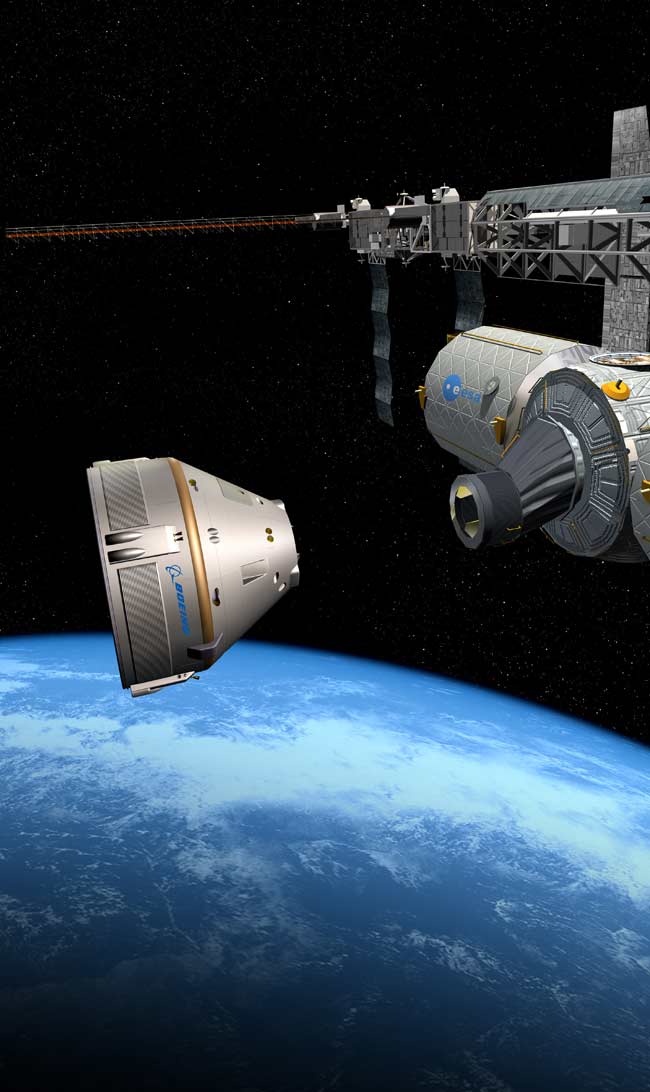Boeing Aims to Fly Passengers to Space on New Capsule

This story was updated at 7 p.m. ET.
Aerospace heavyweight Boeing has teamed up with a private spaceflight marketing firm to sell passenger seats for future flights of its new space capsule.
Under the agreement, the Virginia-based Space Adventures will market passenger seats on commercial flights aboard the Boeing Crew Space Transportation-100 spacecraft, currently being designed to travel to the International Space Station as well as other future private space stations.
The capsule seats could go to space tourists, individual companies or other non-government groups, as well as U.S. federal agencies other than NASA.
"We want to expand beyond flying astronauts just to the ISS," said Brewster Shaw, vice president and general manager of Boeing's Space Exploration division, in a press conference today (Sept. 15). "Very few people have made it to orbit of our species — probably a little over 500 out of 6 or 7 billion people. That's not enough. We want to see many more have that opportunity."
The first test flights of the new CST-100 space capsule are slated to launch by 2015, Boeing officials said. The capsule is designed to launch atop an expendable rocket.
No strangers to spaceflight
Space Adventures has successfully contracted and flown seven spaceflight participants on eight separate missions to the International Space Station. As one of the leading suppliers of human space systems and services, Boeing also has a strong heritage in the industry, company officials said. [10 Private Spaceships Becoming Real]
Get the Space.com Newsletter
Breaking space news, the latest updates on rocket launches, skywatching events and more!
"By combining our talents, we can better offer safe, affordable transportation to commercial spaceflight customers," Shaw said. "If NASA and the international partners continue to accommodate commercial spaceflight participants on ISS, this agreement will be in concert with the NASA administrator's stated intent to promote space commerce in low-Earth orbit."
The two companies have yet to set a price per seat on the CST-100 capsule, but did say it will be competitive with the current Russian launches on Soyuz spacecraft used by Space Adventures. The last passenger trip to the International Space Station — the October 2009 trip of Canadian billionaire Guy Laliberte — cost about $40 million, Space Adventures officials said.
"We're not ready to talk about the price yet," said Eric Anderson, co-founder and chairman of Space Adventures. "Certainly a lot of that comes from the launch vehicle choice, including what the destination is and what the experience is."
Boeing's new reusable spaceship
Boeing's CST-100 spacecraft is approximately 15 feet (4.5 meters) wide and can carry up to seven people. The cone-shaped capsule will look similar to NASA's Apollo and Orion spacecraft.
The company has set a design requirement that the CST-100 be reusable up to 10 times. The exact number of times the capsule is reused, however, will depend upon inspection after touchdown.
The CST-100 is part of the company's $18 million award from NASA under the Commercial Crew Development Space Act Agreement. The award aims to advance the concepts and technology required to build a commercial crew space transportation system.
"We are excited about the potential to offer flights on Boeing's spacecraft," Anderson said. "With our customer experience and Boeing's heritage in human spaceflight, our goal is not only to benefit the individuals who fly to space, but also to help make the resources of space available to the commercial sector by bringing the value from space back to Earth."
Join our Space Forums to keep talking space on the latest missions, night sky and more! And if you have a news tip, correction or comment, let us know at: community@space.com.

Denise Chow is a former Space.com staff writer who then worked as assistant managing editor at Live Science before moving to NBC News as a science reporter, where she focuses on general science and climate change. She spent two years with Space.com, writing about rocket launches and covering NASA's final three space shuttle missions, before joining the Live Science team in 2013. A Canadian transplant, Denise has a bachelor's degree from the University of Toronto, and a master's degree in journalism from New York University. At NBC News, Denise covers general science and climate change.









